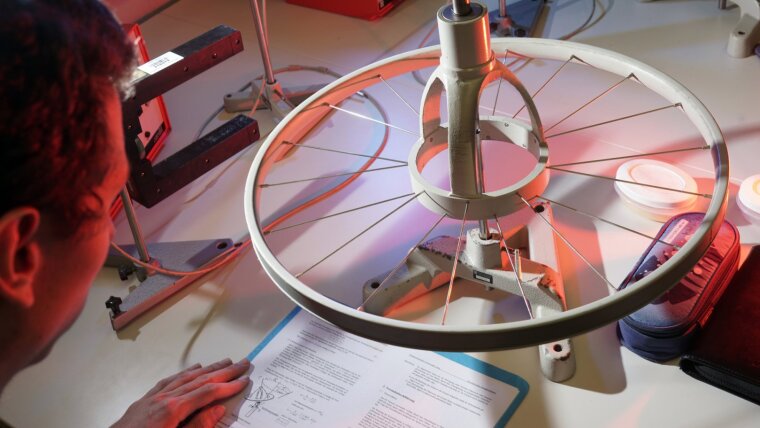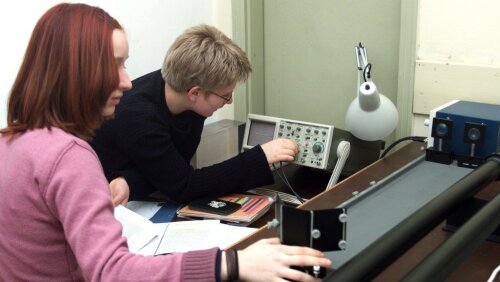
- Degree
- First State Exam Regular School
- Admission restriction
- without admission restriction (without NC)
- Duration
- 10 Semesters
- Credits/ECTS
- 300
- Teaching language
- German
- Tuition fee
- None
- Semester contribution
- € 305,05
- Start of studies
- Winter semester
- Part-time possible
- Yes
- Institution
- Faculty of Physics and Astronomy
The Secondary School Teacher Training (Regelschule) programme has been increased from 270 credit points to 300 credit points as of the winter semester 2024/25 . If you enrol|to matriculate for the winter semester, you will study according to new study and Examination Regulations de. You will complete the specialised study programme in two of your chosen subjects, including subject didactics. Your pedagogical qualification will take place in the educational sciences. You can find more information here de.
Programme content
Physics is in every movement, it is everywhere and surrounds us! This natural science reveals what lies behind numerous everyday phenomena. The focus is on exploring the interrelationships of nature, its individual building blocks and the forces at work. And the enthusiasm for this starts at school!
Teaching is an exciting, demanding and important profession. Given the lack of pupils interested in science, this is particularly true for Physics teachers. However, the profession also presents everyday challenges. The well-coordinated content of the degree programme provides targeted preparation for this. The Physics teaching degree programme offers a solid technical background in all Physics topics relevant to schools and provides the necessary insight into modern Physics research. However, as the best physicists do not necessarily have to be the best physics teachers, the specialised courses are accompanied by extensive subject didactics - which includes everything from planning a physics lesson to a detailed internship on physics experiments in schools. The focus is practical, including support during the school placement semester from an experienced teacher.
Structure
You complete the teacher training programme at the University of Jena with the First State Examination. The standard period of study|regular programme length is ten semesters in total, during which various types of courses (e.g. seminars, lectures or tutorials) are offered for the individual modules. The teacher training programme is based on the Jena model, which is characterised by a five-monthExternal link school placement semesterExternal link in the fifth or sixth semester.
You will study two subjects of your choice, including subject didactics. Your pedagogical qualification takes place in the educational sciences de. A total of 300 credit points (ECTS)|ECTS credits (1 ECTS = 30 hours of attendance, preparation and follow-up work|follow-up activity, study and assessed coursework and examinations) must be completed.
The programme focuses on the following areas:
- Didactic content: in addition to general didactics and pedagogy, all topics relating to the subject-specific didactics of Physics such as student perceptions, use of media, interest in Physics lessons and much more on the theoretical background, but also practical implementation such as setting up, carrying out and evaluating school experiments as well as initial teaching experience of your own
- Experimental physics content: Modules on mechanics, thermodynamics, electricity, optics, solid state physics, nuclear physics, atomic physics
- Theoretical content: Modules on theoretical mechanics, electrodynamics, thermodynamics
- Elective content: Theory of relativity, Astronomy, electronics, renewable energies and much more.
- Internships: Fundamental experiments from all sub-areas in the basic practical course
By the way: To make it easier for you to start your studies, an optional preliminary Mathematics course is also offered before the beginning of lecture period. Participation is strongly recommended for all students.
Further information on the structure of the teacher training course in Jena can be obtained from the Centre for Teacher Training and Educational Research.
Why study in Jena?
- Optimal study conditions: The Faculty of Physics and Astronomy de offers an excellent student-teacher ratio with close contact to the teaching staff and intensive support through preliminary courses, tutorials and exam preparation. To ensure that our first-year students feel at home and find their way around right from the start, the faculty de organises introductory days de with a wide range of tenders and information on the organisation of studies and the university's facilities|institution| de (structural) unit.
- Preparatory work placement before the programme start|start of studies
- Schoolplacement semester: Optimum practical relevance through teaching during your studies. The school placement semester can even be completed at a school abroad.
- Further teaching experience from as early as the 3rd semester through participation in the student laboratory
- Special courses (offered): lectures tailored to the teaching profession in all advanced subject areas and close integration of theoretical Physics with school-related and didactic content
- Elective modules such as Electronics, Astronomy, Computer Science, Renewable Energies, Theory of Relativity, etc.
- Astronomy can be studied alongside Physics and leads to the first state examination in a third teaching subject.
- Excellent education: The faculty consistently prov|to register for|to take good places in teaching evaluations. Why? Because the quality of teaching is among the very best in Germany.
- Active student representatives: Our active student representatives stand up for the interests of the students and offer an extremely attractive extracurricular programme.
What can you do after your studies?
Career opportunities:
- General education: The typical route into school practice is via the preparatory service (traineeship). In this phase, you develop your practical teaching skills on the basis of your degree. In view of the current shortage of teachers in Physics, graduates of the Physics teaching degree programme are more sought after than ever. The recruitment opportunities are accordingly excellent throughout Germany. In Thuringia, there is such an acute need for regular school physics teachers that the excellent opportunities here will not change in the foreseeable future.
- Adult education: Outside of the school system, opportunities are open to you in the adult education subject area|field as a teacher of Physics or often related subjects.
- Should your career aspirations change during the course of your studies, you will be able to switch to typical professional fields for physicists thanks to your qualifications.
The teaching qualification completed in Thuringia is recognised|to credit in all other federal states upon formal request to the respective Ministry of Education and Cultural Affairs. You can apply to the ministries of education of other federal states both for the preparatory service (Referendariat) and for employment in the teaching profession (after completing the second state examination). You can obtain more detailed information on this from the respective Ministry of Education and Cultural Affairs.
Downloads and links for the degree programme
From winter semester 2024/25:
- Recommended study planExternal linkde
- Recommended study plan for educational sciencesExternal linkde
- Module catalogueExternal linkde
- Study and Examination Regulations de
- Information on the teacher training programmepdf, 2 mb · de
- Starting your studies made easy de
- Flyer: Study Secondary School Teacher Training (Regelschule)!pdf, 1 mb · de
Until summer semester 2024:
What are we looking for in prospective students?
- Motivation to work with children and young people in your future career
- Very good knowledge of the German language
- Interest in scientific issues
- Solid knowledge of school maths
- Enjoy puzzling, thinking and experimenting
- Ability to work in a team is a great advantage
Admission requirements
-
University entrance qualification
A university entrance qualification, such as a general secondary school leaving certificate, is required for admission onto the study programme.
More information on university entrance qualifications can be found here.
-
Initial internship
In Jena, the teacher training course includes an introductory internship lasting 240 hours. You should reflect on your educational experience in dealing with children and young people in order to review your career aspirations and make a conscious decision. It makes sense to complete the introductory internship before starting your studies, but it can also be completed before registering for the internship semester (before the start of the third semester). You can also have work you have already done with children and young people recognized.
Contacts
Max-Wien-Platz 1
07743 Jena
Google Maps site planExternal link
Bachstraße 18k
07743 Jena
Telephone hours:
Mondays and Fridays (9:00 – 11:00)
Wednesdays (13:00 – 15:00)
The ASPA is primarily responsible for students in the Faculty of Social and Behavioural Sciences, the Faculty of Arts and Humanities, and the Faculty of Theology.
Postal address:
Akademisches Studien- und Prüfungsamt
Fürstengraben 1
07743 Jena
Carl-Zeiß-Platz 1
07743 Jena
Google Maps site planExternal link
Room E010
Semmelweisstr. 12
07743 Jena
Google Maps site planExternal link
Postal address:
Friedrich-Schiller-Universität Jena
Zentrum für Lehrerbildung und Bildungsforschung
Semmelweisstr. 12
07743 Jena
Room StuRa-Arbeitsraum
Carl-Zeiß-Straße 3
07743 Jena
Google Maps site planExternal link
Max-Wien-Platz 1
07743 Jena
Google Maps site planExternal link
University Main Building / SSZ
Fürstengraben 1
07743 Jena
Google Maps site planExternal link
Office hours:
We offer consultations in person, by telephone, and via Zoom. You can make an appointment by calling us on +49 3641 9-411111 (Mondays to Fridays from 9:00 to 11:00) or outside these office hours on +49 3641 9-411200. You can also use our remote help desk.
Consultation hours:
Mondays, Tuesdays, Thursdays and Fridays (9:00 to 12:20), Tuesdays (14:00 to 18:00), and Wednesdays and Thursdays (14:00 to 16:00).
Video chat: To the video chat – Zoom Videochat ZeitenMondays to Fridays (12:30 to 13:00) Password ZSB2020 Data protection informationpdf, 101 kb
University Main Building, Room E065
Fürstengraben 1
07743 Jena
Google Maps site planExternal link
Opening hours:
Information Desk (UHG; Room E0.65)
Mondays (10:00 – 12:00)
Tuesdays (13:00 – 15:00)
Wednesdays (10:00 – 12:00)
Thursdays (13:00 – 15:00)
Fridays (10:00 – 12:00)
You can also use our remote help desk at
www.uni-jena.de/service-ssz
or send us your enquiries by post.
Telephone hours:
Mondays to Fridays
(9:00 – 11:00)
Postal address:
Friedrich-Schiller-Universität Jena
Studierenden-Service-Zentrum
07737 Jena
University Main Building
Fürstengraben 1
07743 Jena
Google Maps site planExternal link
